
Regular vehicle maintenance is the key to ensuring your car runs smoothly, remains safe to drive, and has a long and trouble-free life. In this guide, we’ll emphasize the importance of vehicle maintenance, provide essential do-it-yourself (DIY) car maintenance tips, discuss common signs of car problems, and highlight the benefits of regular check-ups.
The Importance of Vehicle Maintenance
Proper vehicle maintenance is more than just an option; it’s a necessity for car owners. Here’s why it’s crucial:
Prolonged Lifespan: Regular maintenance helps extend the life of your vehicle. Components that receive proper care tend to last longer and function optimally.
Safety First: Well-maintained vehicles are safer to drive. Regular checks ensure that critical systems like brakes and steering are in good working order, reducing the risk of accidents.
Cost Savings: Addressing minor issues during routine maintenance can prevent them from becoming major, costly repairs down the road. It’s more cost-effective to replace a worn-out belt than to deal with engine damage caused by its failure.
Optimal Performance: Maintaining your car’s engine, transmission, and other systems ensures they operate efficiently. This can improve fuel economy and overall performance.
DIY Car Maintenance Tips
You don’t need to be a mechanic to perform basic car maintenance tasks. Here are some essential DIY maintenance tips:
Checking Oil Levels:
- Park your car on a level surface and turn off the engine.
- Locate the oil dipstick, typically with a bright handle.
- Pull the dipstick out, wipe it clean, reinsert it fully, and pull it out again.
- Check the oil level; it should be between the two marks on the dipstick. Add oil if needed.
Inspecting Tire Pressure:
- Use a tire pressure gauge to check the pressure of all four tires.
- Refer to the recommended tire pressure in your car’s manual or on a sticker inside the driver’s door.
- Inflate or deflate tires as necessary to match the recommended pressure.
Changing Air Filters:
- Locate the air filter housing, usually near the engine.
- Remove the housing cover and take out the old air filter.
- Replace it with a new, clean air filter.
- Reattach the housing cover securely.
Checking Brake Fluid:
- Locate the brake fluid reservoir under the hood.
- Ensure the fluid level is between the “min” and “max” marks.
- If it’s low, top it up with the appropriate brake fluid.
These simple tasks can be performed regularly to keep your car in good condition and help you catch minor issues early.
Signs of Common Car Problems
Being aware of common car problems and their signs can save you from potential breakdowns and costly repairs. Here are some common issues to watch for:
Engine Overheating:
- Signs: High engine temperature gauge, steam from the engine, and warning lights.
- Causes: Low coolant, a malfunctioning thermostat, or a faulty radiator.
- Action: Pull over, turn off the engine, and wait for it to cool before checking coolant levels and seeking professional help if needed.
Strange Noises:
- Signs: Unusual noises like grinding, knocking, or squealing.
- Causes: Various issues, including worn brake pads, damaged belts, or loose components.
- Action: Identify the source of the noise and consult a mechanic for diagnosis and repairs.
Dashboard Warning Lights:
- Signs: Illuminated warning lights such as the check engine light, ABS light, or airbag light.
- Causes: Sensor malfunctions, engine issues, or electrical problems.
- Action: Use an OBD-II scanner to retrieve error codes, and consult a mechanic for diagnosis and necessary repairs.
The Benefits of Regular Check-Ups
While DIY maintenance is essential, it’s equally important to schedule regular professional check-ups for your vehicle.
Here’s why routine check-ups are valuable:
Preventive Maintenance: Mechanics can identify and address potential issues before they become major problems, saving you time and money.
Comprehensive Inspections: Professional inspections cover all aspects of your vehicle, including safety-critical systems like brakes and steering.
Warranty Compliance: Regular check-ups help maintain your vehicle’s warranty validity, ensuring that any warranty-covered repairs are honored.
Peace of Mind: Knowing that your car has been thoroughly examined by a professional can give you confidence on the road, especially during long trips.
Customized Advice: Mechanics can provide tailored advice based on your specific vehicle’s needs and usage patterns.
Taking care of your vehicle is not just about extending its lifespan; it’s about ensuring your safety, optimizing performance, and saving money in the long run. By performing basic DIY maintenance, staying vigilant for common car problems, and scheduling regular check-ups with a trusted mechanic, you can keep your car in top shape and enjoy worry-free driving for years to come. Remember, a well-maintained car is not just a means of transportation; it’s an investment in your safety and convenience.




I stumbled upon your blog while looking for ways to improve my car’s performance, and I’m thrilled with the wealth of information you’ve provided. Your tips are not only practical but also budget-friendly, making car maintenance accessible to everyone. I’m already seeing improvements in my car’s mileage and overall performance, all thanks to your expert advice. Keep up the fantastic work!
I stumbled upon your blog while looking for ways to improve my car’s performance, and I’m thrilled with the wealth of information you’ve provided.Keep up the fantastic work!
I just wanted to take a moment to express my gratitude for your blog. Your tips for keeping cars in top shape are not only practical but also incredibly effective.Thank you for sharing your expertise with the world!